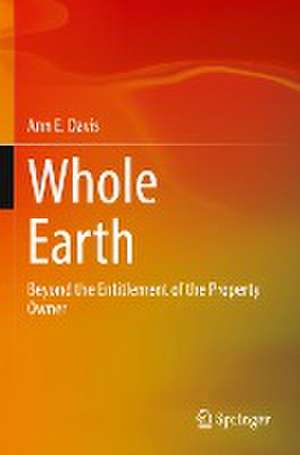Whole Earth: Beyond the Entitlement of the Property Owner
Autor Ann E. Davisen Limba Engleză Paperback – 5 iul 2023
The volume integrates insights from a variety of fields, including humanities, natural, and social science, placing human life in the setting of ecology. The chapters invoke a historical institutional methodology to examine the link between economic theories and economic institutions, understanding performativity and applying reflexivity, and the potential for the emergence of new visions and methods. The method draws upon literary studies, linguistic philosophy, as well as long term economic history. Providing an alternative view of the relationship of humans to the earth, this book is appropriate for students and researchers across a variety of disciplines including economics, history, ecology, and philosophy.
| Toate formatele și edițiile | Preț | Express |
|---|---|---|
| Paperback (1) | 680.12 lei 6-8 săpt. | |
| Springer International Publishing – 5 iul 2023 | 680.12 lei 6-8 săpt. | |
| Hardback (1) | 686.22 lei 6-8 săpt. | |
| Springer International Publishing – 5 iul 2022 | 686.22 lei 6-8 săpt. |
Preț: 680.12 lei
Preț vechi: 800.14 lei
-15% Nou
Puncte Express: 1020
Preț estimativ în valută:
130.20€ • 133.90$ • 108.01£
130.20€ • 133.90$ • 108.01£
Carte tipărită la comandă
Livrare economică 19 februarie-05 martie
Preluare comenzi: 021 569.72.76
Specificații
ISBN-13: 9783031019364
ISBN-10: 3031019369
Ilustrații: XIV, 175 p. 31 illus., 27 illus. in color.
Dimensiuni: 155 x 235 mm
Greutate: 0.28 kg
Ediția:1st ed. 2022
Editura: Springer International Publishing
Colecția Springer
Locul publicării:Cham, Switzerland
ISBN-10: 3031019369
Ilustrații: XIV, 175 p. 31 illus., 27 illus. in color.
Dimensiuni: 155 x 235 mm
Greutate: 0.28 kg
Ediția:1st ed. 2022
Editura: Springer International Publishing
Colecția Springer
Locul publicării:Cham, Switzerland
Cuprins
Part I: Basic Framework.- Chapter 1.: Beyond Reification: Envisioning the Earth.- Chapter 2: The Modern Institution of Science.- Chapter 3: The History of Political Economy.- Part II. Conceptual Development and Critique of Capitalism.- Chapter 4: Fictitious Capital: Money, the Symbol and the State.- Chapter 5: Public/Private Divide.- Chapter 6: Abstraction and Reification.- Part III: Alternatives.- Chapter 7: History of Commodification and Proletarianization in the US.- Chapter 8: Regional Ecological Communities.- Chapter 9: Conclusion and Further Reflections.
Notă biografică
Ann E. Davis is an Associate Professor of Economics at Marist College in Poughkeepsie, New York (US). She was Director of the National Endowment for the Humanities Summer Institute on the Meanings of Property in 2014. She is author of The Evolution of the Property Relation: Understanding Paradigms, Debates, and Prospects (Palgrave MacMillan, 2015), and Money as a Social Institution: The Institutional Development of Capitalism (Routledge, 2017). In 2020, she published The End of Individualism and the Economy: Emerging Paradigms of Connection and Community, published by Routledge. She has published articles in the Review of Radical Political Economics, Cambridge Journal of Economics, Journal of Economic Issues, Critical Historical Studies, and Science and Society, as well as book chapters.
Textul de pe ultima copertă
This book takes a radical approach to ecological economics, proposing a new paradigm based on earth systems science. This book questions the foundation of economics on individual private property, and proposes new forms of relationship to land and to the state. It questions the foundation of economics on the individual, and proposes new forms of regional ecological collectives, integrated at the global level. It critically examines the assumptions of economics and re-envisions it as more integrally related to society and ecology.
The volume integrates insights from a variety of fields, including humanities, natural, and social science, placing human life in the setting of ecology. The chapters invoke a historical institutional methodology to examine the link between economic theories and economic institutions, understanding performativity and applying reflexivity, and the potential for the emergence of new visions and methods. The method draws upon literary studies, linguistic philosophy, as well as long term economic history. Providing an alternative view of the relationship of humans to the earth, this book is appropriate for students and researchers across a variety of disciplines including economics, history, ecology, and philosophy.
The volume integrates insights from a variety of fields, including humanities, natural, and social science, placing human life in the setting of ecology. The chapters invoke a historical institutional methodology to examine the link between economic theories and economic institutions, understanding performativity and applying reflexivity, and the potential for the emergence of new visions and methods. The method draws upon literary studies, linguistic philosophy, as well as long term economic history. Providing an alternative view of the relationship of humans to the earth, this book is appropriate for students and researchers across a variety of disciplines including economics, history, ecology, and philosophy.
Caracteristici
Proposes an alternative to economics paradigm, based on natural science, social science, and the humanities Analyzes economics paradigm in terms of inequality, environmental degradation, political conflict Integrates economic history, literary studies and linguistic philosophy
